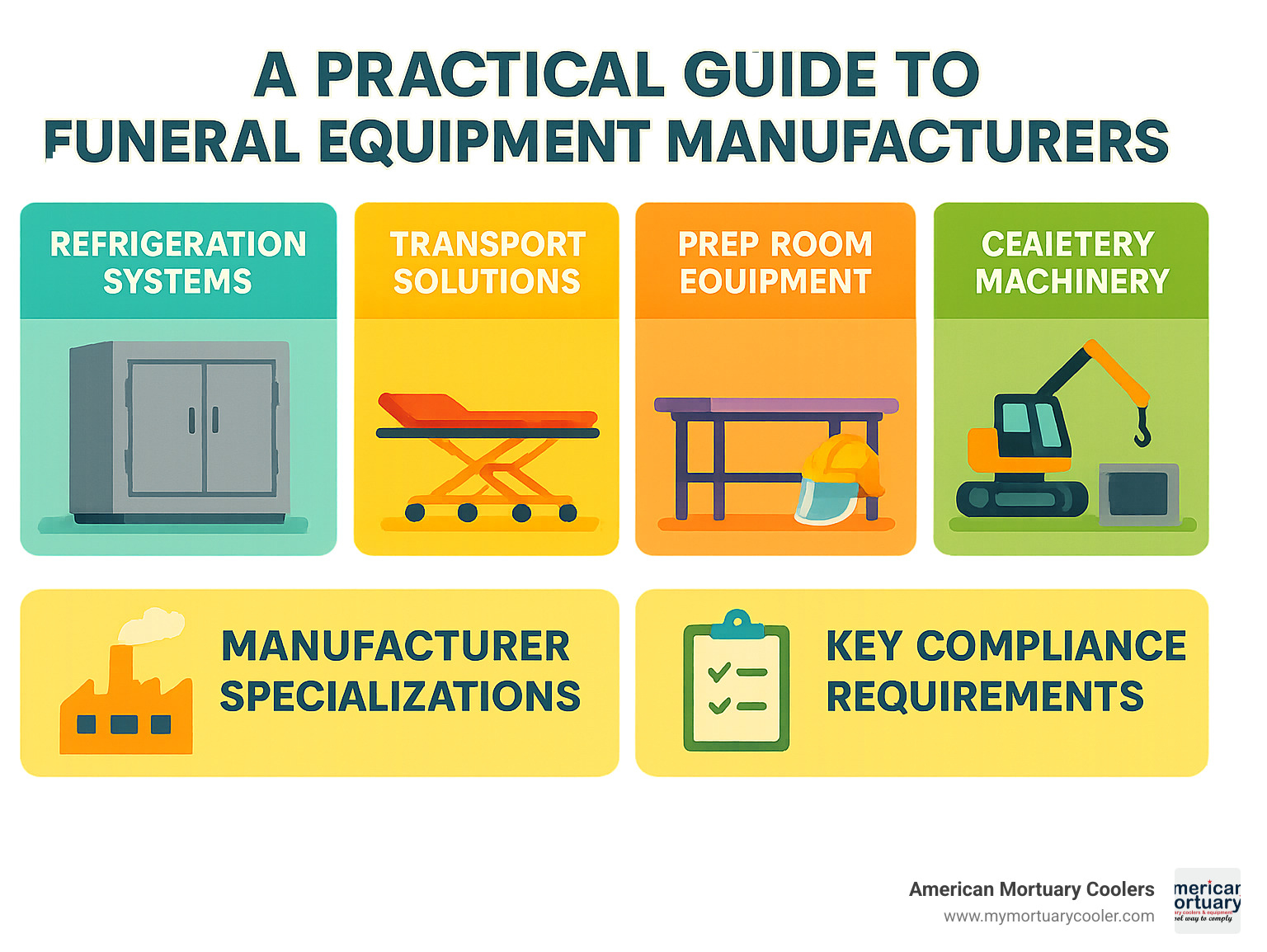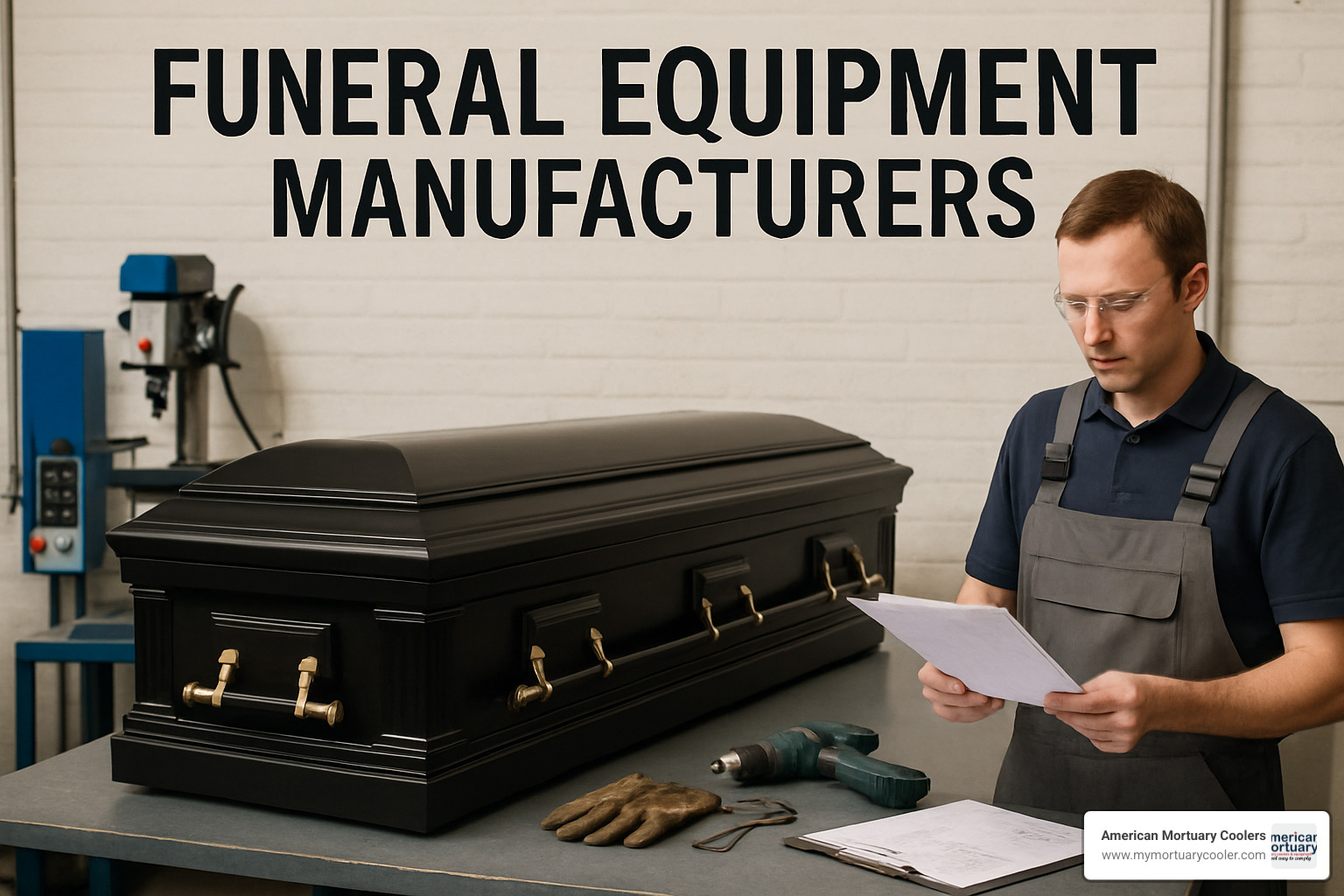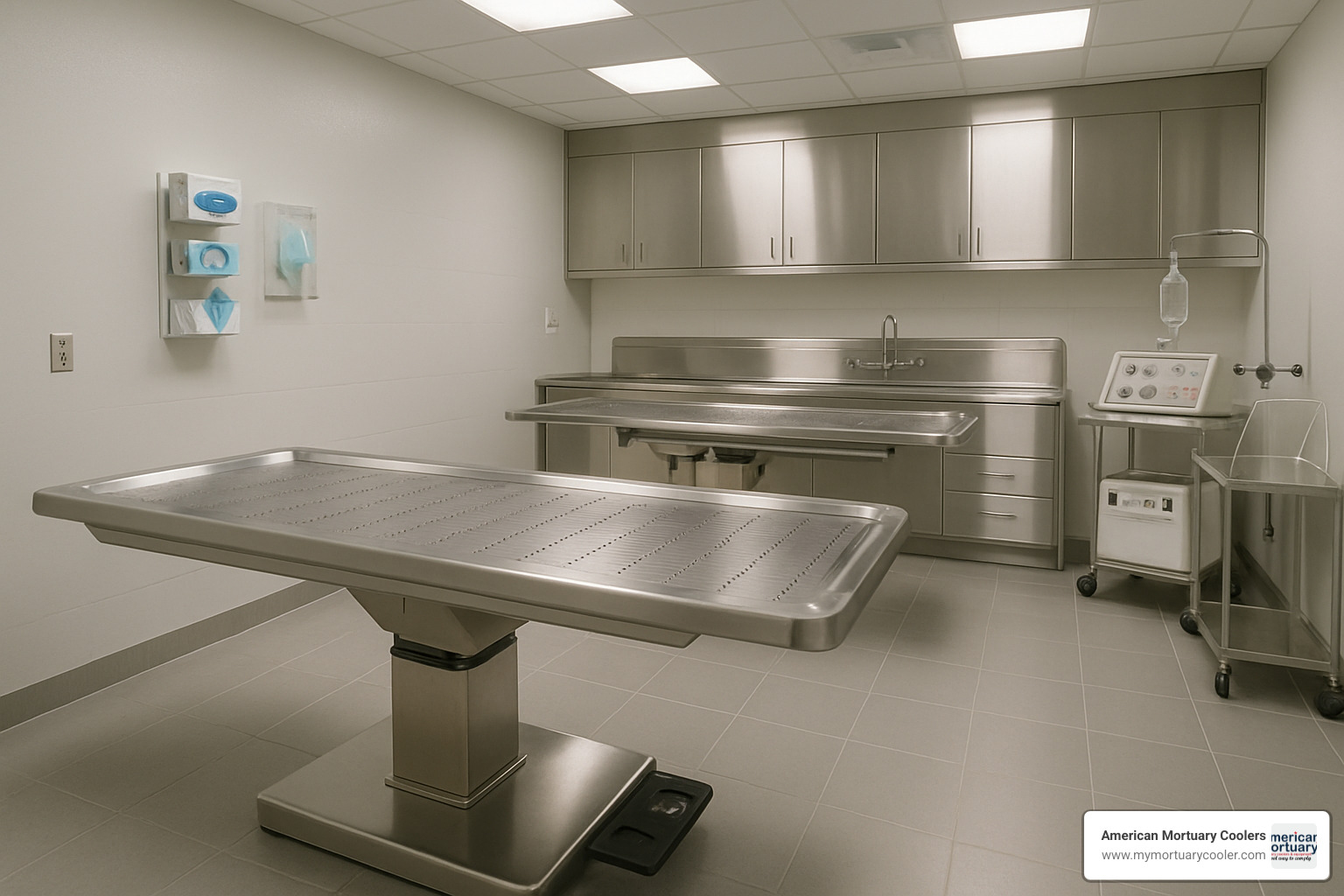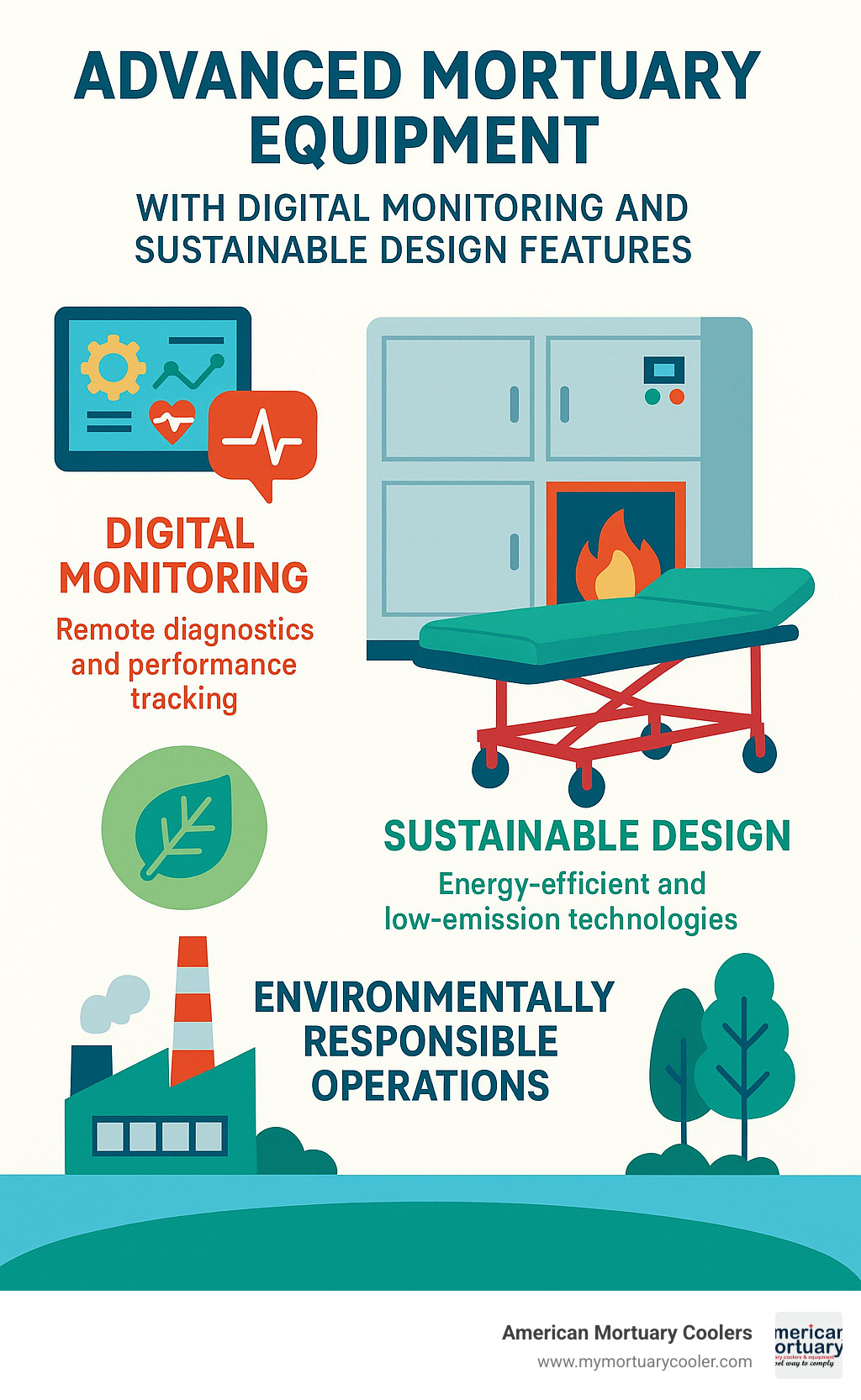Why Funeral Equipment Manufacturers Are Essential to Modern Death Care
Funeral equipment manufacturers form the backbone of the death care industry, supplying everything from mortuary coolers and embalming tables to casket lifts and cremation equipment. With over 7,561 fitting manufacturers and 7,544 service providers globally, this specialized industry ensures funeral homes have the tools needed to serve families with dignity and safety.
Key Types of Funeral Equipment Manufacturers:
- Refrigeration specialists - mortuary coolers, walk-in cold rooms, body storage racks
- Transport equipment makers - stretchers, lifts, church trucks, removal cots
- Prep room suppliers - embalming tables, autopsy equipment, safety gear
- Cemetery equipment manufacturers - lowering devices, vault handlers, tents
- Cremation equipment providers - retorts, processing equipment, urns
The industry spans from established companies like Lynch Supply (serving since 1932) to newer innovators. Most manufacturers employ 51-100 people and focus on quality, safety, and regulatory compliance to meet strict OSHA and health department standards.
Modern funeral directors need reliable partners who understand death care operations. Equipment failures can't happen during services, and every piece must meet stringent sanitation and safety requirements while handling loads often exceeding 1,000 pounds.
I'm Mortuary Cooler, a national-level mortuary cooler supplier with extensive experience working with funeral equipment manufacturers across the United States. My background in cooling and refrigeration has given me insights into how manufacturers design, build, and support specialized equipment that keeps funeral operations running smoothly.

Simple guide to funeral equipment manufacturers terms:
Understanding Funeral Equipment & Why It Matters
Funeral equipment manufacturers create an entire ecosystem of specialized tools that handle every step of caring for the deceased, from transport to final resting place. This goes far beyond caskets and flowers.
Funeral directors need to safely transport someone who might weigh 300+ pounds, preserve the body for weeks, and create peaceful environments for grieving families. None of this happens without the right equipment.
The gear falls into distinct categories. Body preparation equipment includes hydraulic embalming tables with foot pedal controls and specialized embalming machines. Transport gear covers heavy-duty stretchers to battery-powered lifts that protect workers' backs. Refrigeration systems maintain exact temperatures for weeks using walk-in coolers and roll-in units.
What makes this equipment special is balancing industrial strength with respectful appearance. A mortuary stretcher needs to handle 1,000 pounds safely while looking dignified around families. That's why manufacturers use medical-grade stainless steel with clean, respectful designs.
Infection control is crucial. Every surface must handle repeated cleaning with industrial disinfectants, requiring antimicrobial coatings, leak-proof seals, and materials that won't break down after years of chemical exposure.
Core Functions of Funeral Equipment
Embalming and preparation happens in specialized prep rooms with hydraulic tables adjusting to comfortable working heights. Embalming machines inject preservative fluids through networks of tubes and pumps, requiring proper drainage and ventilation systems.
Lifting and transport prioritizes safety when moving people in tight spaces. Equipment like "The Stepper" stair-climbing system (375-pound capacity) and battery-powered lifts have largely replaced risky manual lifting.
Cooling and storage maintains the critical 35-40°F range that slows decomposition. Roll-in coolers provide individual storage, walk-in cold rooms serve larger operations, and specialized racks maximize organized space.
Casket and display handling covers equipment families see during services. Church trucks move caskets smoothly and quietly, while display stands support 400+ pounds safely with dignified appearance.
Graveside operations complete the process with lowering devices and vault handling equipment. Companies like Meacon have perfected automatic systems since 1992, using cast aluminum and precision-machined parts for reliable all-weather operation.
Regulatory & Safety Framework
Funeral equipment manufacturers steer complex regulations. OSHA workplace safety rules drive innovation in ergonomic lifting requirements, leading to battery-powered lifts and hydraulic systems. Chemical exposure limits push improved ventilation and protective equipment integration.
Sanitation standards are intense. Health departments require thorough disinfection between uses, explaining the prevalence of medical-grade stainless steel and antimicrobial treatments.
International markets add complexity. European sales need CE marking certification. Quality-focused manufacturers pursue ISO 9001 certification. The result is incredibly robust, safe equipment that costs more than regular commercial gear but handles decades of intensive use while meeting strict regulatory requirements. Catalogs Products show these detailed specifications.

Mapping the Funeral Equipment Manufacturers Landscape
The funeral equipment manufacturers industry spans 7,561 manufacturers and 7,544 service providers globally, reflecting both universal human needs and regional preferences. Death is universal, but how we honor the deceased varies dramatically by culture and geography.
The United States leads as the dominant manufacturing force, given the size of the American death care market and early adoption of modern funeral practices. European manufacturers bring precision engineering and quality systems, while emerging markets in Africa and Asia show increasing sophistication with better local cultural understanding.
The industry ranges from established companies like Lynch Supply (serving since 1932) to newer innovators founded recently. Most manufacturers employ 51-100 people, focusing on quality, safety, and regulatory compliance. Equipment failures during services aren't acceptable, and every piece must meet strict sanitation requirements while handling 1,000+ pound loads.
Top Funeral Equipment Manufacturers Worldwide
Ferno stands out for comprehensive funeral vehicle equipment, offering church trucks to specialized casket tables. Their Model 124 Adjustable Casket Table combines functionality with durability at reasonable prices.
A R Twigg & Son Ltd represents 60+ years of British manufacturing excellence from West Yorkshire. They've built impressive international reach serving markets from Hong Kong to Australia, manufacturing hydraulic trolleys, refrigeration units, and custom storage solutions.
Auden Funeral Supplies has served UK funeral directors for 25 years, manufacturing "the largest range of removal equipment in the UK" and recently earning ISO 9001:2015 certification. Their mobile showrooms let directors experience equipment hands-on before purchasing.
Link has specialized in mortuary deck systems for 20+ years, focusing on North American markets with single and double deck systems, suburban ramps, and showroom systems built around quality, safety, and service.
Mortuary Lift Company brings 50+ years of experience in casket and body lifts worldwide. Their "Ultimate 1000 Lift" represents their All-in-One system approach with custom engineering for funeral homes, morgues, and hospitals.
Emerging Regional Manufacturers
South African Funeral Supplies has served since 1998, building recognition for superior quality and innovation across Africa. They specialize in exclusive casket designs and custom solutions reflecting regional cultural requirements.
Meacon, established in 1992, leads Southern Africa in coffin lowering devices using precision cast aluminum and CNC-machined components, proving regional manufacturers achieve world-class quality in specialized niches.
Mobi Medical Supply focuses on high-quality supplies "at lowest available prices," emphasizing industrial-grade stainless steel and Made in USA manufacturing for buyers preferring domestic sourcing.
William Kenyon offers comprehensive mortuary equipment design, manufacture, installation, and service throughout Europe and the UK, excelling in customization and personal service that global companies often miss.
Product Categories, Innovation & Trends
Funeral equipment manufacturers are moving beyond traditional durability focus to accept innovations making funeral work safer, more efficient, and surprisingly high-tech.
Battery power is changing operations. Modern lithium systems provide consistent power for hundreds of cycles, eliminating electrical outlet hassles during transport. Digital monitoring has turned refrigeration into smart systems sending temperature alerts to smartphones, preventing failures while maintaining health compliance.
Worker safety drives innovation. Equipment like "The Stepper" electric stair climbing system acts as a "second attendant" during difficult removals, reducing back injuries plaguing the industry. Environmental consciousness reshapes development with biodegradable urns from cornstarch and recycled materials, plus energy-efficient refrigeration systems. More info about coolers shows advancing cooling technology.
Refrigeration & Body Storage
Mortuary refrigeration evolved from simple cooling to sophisticated climate control maintaining precise 35-40°F temperatures with required reliability.
Roll-in coolers represent the current standard with stainless steel construction, digital controls, and backup alarms preventing temperature excursions. Bodies transport directly from preparation to storage without lifting.
Walk-in cold rooms serve larger facilities needing maximum capacity. Companies like A R Twigg specialize in custom designs maximizing space while maintaining easy staff access, often incorporating sophisticated organization rack systems.
Remote monitoring has transformed cooling management. Facilities track temperature, humidity, and performance from anywhere via smartphone apps, ensuring rapid issue response while preventing costly failures and maintaining health compliance.
Handling & Transport Solutions
Modern transport solutions handle increasing weight loads while protecting staff from traditional back injuries.
Bariatric stretchers routinely handle 1,000+ pound loads with reinforced construction, wider platforms, and improved stability for safe transport regardless of size.
Stair climbing systems like "The Stepper" eliminate manual lifting strain on stairs. With 375-pound capacity and battery power, they steer stairs safely requiring minimal operator effort.
Vehicle deck systems maximize storage efficiency. Link's double deck systems can double cargo van storage, while suburban ramps convert standard SUVs into transport vehicles, helping optimize fleet investments.
Prep-Room & Embalming Technology
Modern prep rooms blend advanced technology with traditional practices, creating more efficient, safer work environments.
Hydraulic embalming tables with foot pedal controls allow precise positioning while keeping hands free, improving ergonomics and efficiency during lengthy procedures.
Embalming machines provide precise fluid injection with better flow control and monitoring, helping achieve consistent results while reducing chemical waste and exposure.
PPE integration became standard in prep room design, incorporating splash guards, ventilation systems, and easy-clean surfaces. COVID-19 accelerated improved safety measures now permanent in modern facilities.

Cemetery & Crematory Equipment
Cemetery operations require equipment handling tough conditions while maintaining family-expected dignity. Coffin lowering devices like Meacon's use precision engineering ensuring controlled, respectful burial procedures eliminating manual lowering awkwardness.
Cremation equipment evolved toward efficient, environmentally friendly designs. Modern retorts use advanced combustion controls and emissions reduction meeting strict environmental regulations while maintaining operational efficiency.
Eco-friendly innovations include biodegradable urns from rock salt, cornstarch, and recycled paper, meeting growing demand for environmentally conscious options allowing families to choose values-aligned services.
Choosing the Right Funeral Equipment Supplier
Finding the right funeral equipment manufacturers requires looking beyond sticker price—you're making decisions affecting operations for decades.
Equipment serves families during their most difficult moments. You need suppliers understanding this sacred trust and building products accordingly.
Durability should top priorities. Funeral equipment can't fail during services. Look for manufacturers using industrial-grade stainless steel, corrosion-resistant coatings, and components built for decades, not years.
Load capacity matters more than expected. Equipment rated for 1,000+ pounds provides flexibility for challenging situations while protecting staff. Better to have unneeded capacity than need unavailable capacity.
Total cost of ownership—maintenance, training, parts, support—often costs more than original equipment over its lifetime. Cheaper units breaking down frequently become expensive quickly.
Warranty coverage reveals manufacturer confidence. Companies offering 15-year panel warranties and 5-year mechanical warranties stand behind their work. Shorter warranties raise red flags.
After-sales service can make or break experiences. Equipment problems don't wait for business hours. Manufacturers with nationwide service networks, 24/7 support, and comprehensive parts availability keep you running when problems arise.
Comprehensive Solutions for Mortuary Needs walks through evaluating suppliers for specific facility needs.
Vetting Quality & Compliance
Certifications matter but are starting points. FDA, CE, and ISO 9001 certifications show manufacturers meet recognized standards, but dig deeper into construction details and materials.
Medical-grade stainless steel is essential for equipment withstanding rigorous sanitation while maintaining professional appearance. Antimicrobial coatings and leak-proof seals aren't extras—they're necessities.
Training programs reveal manufacturer commitment to your success. Companies providing comprehensive training, detailed manuals, and ongoing support want you to succeed. Those shipping products and disappearing don't.
| Certification | Required Tests | Industry Relevance |
|---|---|---|
| FDA | Material safety, biocompatibility | Body contact equipment |
| CE Marking | Safety, health, environmental protection | European market access |
| ISO 9001 | Quality management systems | Consistent manufacturing processes |
| OSHA Compliance | Workplace safety standards | Staff protection requirements |
Negotiating Price & Support
Don't accept first quotes. Even single purchases often qualify for volume pricing when demonstrating market knowledge or committing to ongoing supplier relationships.
Financing options have become standard. Payment plans help manage cash flow for major purchases. Traditional equipment loans and lease-purchase agreements provide additional flexibility.
Maintenance contracts provide peace of mind and predictable expenses. Annual service agreements typically cost 10-15% of equipment value but prevent costly emergency repairs while extending equipment life significantly.
The key is building relationships with funeral equipment manufacturers seeing you as long-term partners, not just sales. These relationships pay dividends when needing emergency support or expanding capabilities.
Sustainability, Customization & the Future
The death care industry experiences quiet revolution as funeral equipment manufacturers accept environmental responsibility and cutting-edge technology, reflecting changing consumer preferences and industry commitment to reducing environmental footprint while maintaining family-deserved dignity.
Eco-friendly materials change traditional products surprisingly. Urns from cornstarch dissolve naturally in water, while rock salt versions return to earth tracelessly. Recycled paper and mulberry bark create beautiful, biodegradable containers honoring loved ones while protecting environment.
Energy efficiency prioritizes refrigeration development. Modern mortuary coolers use advanced insulation and variable-speed compressors cutting energy consumption up to 40% compared to older models, helping funeral homes reduce costs while supporting environmental goals.
Digital integration changes equipment operation and communication. Remote monitoring systems track temperature, humidity, and performance around the clock, sending smartphone alerts when attention is needed. Predictive diagnostics identify potential problems before expensive failures.
News & Trends keeps professionals updated on latest innovations shaping funeral equipment development.
Bespoke Solutions & Market-Specific Needs
Every funeral home faces unique challenges, and the best funeral equipment manufacturers understand one size doesn't fit all. Space constraints, cultural requirements, and operational preferences create demand for customized solutions standard equipment can't address.
Cremation versus burial services fundamentally changes equipment needs. Cremation-focused facilities require different refrigeration configurations, transport equipment, and preparation tools than traditional burial operations. Smart manufacturers design flexible systems adapting to changing service preferences.
Cultural preferences significantly influence equipment requirements across communities. Religious and ethnic traditions may require specific body handling procedures, preparation methods, or presentation styles demanding specialized solutions. Manufacturers understanding these nuances build lasting relationships with diverse communities.
The growing pet death-care market creates demand for scaled-down traditional equipment versions. Smaller refrigeration units, specialized cremation equipment, and unique memorial products serve pet owners wanting the same care for beloved animals they'd expect for family members.
At American Mortuary Coolers, we've seen diverse needs through our work across multiple regions and cultural communities. Our custom mortuary coolers serve facilities from Johnson City, TN to Los Angeles, adapting to local preferences while maintaining consistent quality standards.
Outlook for 2030 and Beyond
Artificial intelligence and machine learning will revolutionize funeral equipment through predictive maintenance anticipating problems before occurrence. Smart systems will automatically order replacement parts, schedule service appointments, and optimize facility operations without human intervention.
Manufacturing processes shift toward carbon-neutral operations as companies respond to environmental regulations and customer preferences, including renewable energy, sustainable materials, and carbon-neutral shipping reducing industry environmental impact.
Remote diagnostics capabilities will enable manufacturers troubleshooting equipment issues without expensive site visits. Augmented reality systems may guide local staff through complex repairs using smartphone cameras and expert guidance from thousands of miles away.

Frequently Asked Questions about Funeral Equipment Manufacturers
How do manufacturers ensure products meet health and safety regulations?
Funeral equipment manufacturers take regulatory compliance seriously because lives depend on equipment working safely. Different equipment faces different rules. Body-contact equipment needs FDA approval ensuring materials won't cause harm. European sales require CE marking proving safety standards compliance. Many manufacturers pursue ISO 9001 certification for quality management systems.
Smart manufacturers build regulatory agency relationships and stay connected to industry associations. When rules change, these companies know first. The real work happens in testing and validation—materials get analyzed for safety and durability, products undergo real-world performance testing, and third-party inspectors verify claims match delivery.
What innovations are reducing manual lifting risks for staff?
Lifting and moving deceased individuals in difficult spaces has traditionally meant back injuries and worker compensation claims. Battery-powered lifting systems represent the biggest breakthrough. "The Stepper" electric stair climbing system handles up to 375 pounds, described by staff as having "a second attendant" because it eliminates manual stair carrying.
Modern lifts routinely handle 1,000+ pound loads with wireless remote controls, letting operators stand at safe distances while equipment does heavy work. Even basic transport equipment has gotten smarter with multi-level designs and improved stability systems reducing physical strain during transport.
Which factors most influence total cost of ownership when purchasing new equipment?
The sticker price often matters less than what happens over the next 20 years. Total cost of ownership includes purchase price, maintenance, energy costs, and replacement expenses—with durability usually the biggest factor.
Industrial-grade stainless steel construction costs more upfront but serves decades with minimal maintenance. Cheaper materials might save initially but cost more in repairs, replacements, and downtime. Service and support capabilities create the second biggest cost impact. When equipment breaks during busy periods, you need fast help. Energy efficiency particularly affects refrigeration equipment—modern mortuary coolers can reduce consumption 30-50% compared to older units, creating substantial lifetime savings.
Conclusion
The journey through funeral equipment manufacturers reveals an industry that's both deeply rooted in tradition and surprisingly innovative. From companies like Lynch Supply, who've been serving families since 1932, to cutting-edge manufacturers developing AI-powered diagnostics, this industry shows remarkable resilience in adapting to changing needs while never losing sight of its core mission: helping funeral directors serve families with dignity during their most difficult moments.
What strikes me most about this industry is its incredible diversity. With 7,561 manufacturers and 7,544 service providers worldwide, funeral directors today have access to solutions that would have been unimaginable just a generation ago. Whether you need a basic mortuary cot or a sophisticated refrigeration system with remote monitoring, there's likely a manufacturer who specializes in exactly what you need.
The evolution toward comprehensive, single-source partnerships makes perfect sense when you consider the pressures facing modern funeral homes. Directors don't want to juggle relationships with dozens of different suppliers—they want partners who understand their complete operation and can provide integrated solutions from design through decades of reliable service.
This is where companies like us at American Mortuary Coolers fit into the bigger picture. We've built our reputation by focusing on what matters most: crafting custom mortuary coolers that work perfectly for each facility's unique needs. Whether we're delivering to a small family funeral home in Tennessee or a large facility in Los Angeles, our approach remains the same—understand the specific requirements, build equipment that exceeds expectations, and provide support that funeral directors can count on.
Looking ahead, the industry's commitment to sustainability, worker safety, and technological innovation promises exciting developments. But the fundamental values that have driven funeral equipment manufacturers for generations—quality, reliability, and respect for the families being served—will continue to guide this industry forward.
The equipment may become smarter, more efficient, and more environmentally friendly, but the core responsibility remains unchanged: ensuring that funeral directors have tools that never fail when families need them most. This understanding drives every decision manufacturers make, from material selection to service network design.
For funeral directors evaluating equipment suppliers, the message is clear: choose partners who demonstrate not just technical competence, but genuine understanding of your mission. The best manufacturers know they're not just selling equipment—they're providing the foundation that allows funeral professionals to serve families with the dignity and care they deserve.
A Comprehensive Guide to Funeral Equipment Suppliers offers additional insights for directors seeking manufacturers who truly understand the unique demands of death care operations and the critical importance of equipment reliability when it matters most.



















